

Hi-Crush reopens one mine, closes another; cites shifting demand for frac sand. One of Wisconsin’s largest frac sand producers has reopened one mine while idling another.
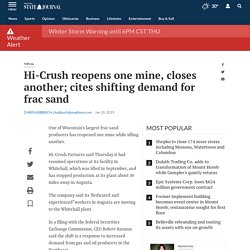
Hi-Crush Partners said Thursday it had resumed operations at its facility in Whitehall, which was idled in September, and has stopped production at its plant about 30 miles away in Augusta. How rural northern Wisconsin logged a record-setting solar group buy. “It was a unique situation,” an energy company official said — an all-volunteer citizens nonprofit group led the charge.

Correction: Danielle Kelly is lead sales consultant for Next Energy Solution. A previous version of this story misreported her position. The Poison Papers Project – The Poison Papers. The Poison Papers is a project of The Bioscience Resource Project and The Center for Media and Democracy.

The Bioscience Resource Project The mission of The Bioscience Resource Project is to provide the highest quality scientific information and analysis to enable a healthy food system and a healthy world. The Bioscience Resource Project is an educational nonprofit based in Ithaca New York, USA. It is the publisher of Independent Science News. Sheep in the Closet. Group files lawsuits to stop Back Forty Mine. GREEN BAY (WLUK) – A group known as the “Coalition to SAVE the Menominee River” filed suit against the two federal agencies, seeking to stop a planned mine for Michigan’s Upper Peninsula.
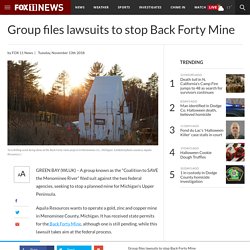
Aquila Resources wants to operate a gold, zinc and copper mine in Menominee County, Michigan. Wisconsin 2018 Midterm Election Questionnaire - Backcountry Hunters and Anglers. Wisconsin Backcountry Hunters & Anglers members will vote in several crucial elections in 2018 that will affect hunting, fishing, and the management of wildlife and public lands, including governor, who appoints the Department of Natural Resources Secretary and nominates the members of the Natural Resources Board.
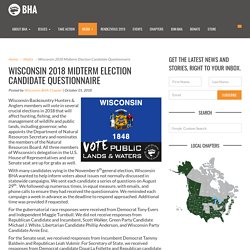
All three members of Wisconsin’s delegation in the U.S. House of Representatives and one Senate seat are up for grabs as well. With many candidates vying in the November 6thgeneral election, Wisconsin BHA wanted to help inform voters about issues not normally discussed in statewide campaigns. We sent each candidate a series of questions on August 29th. We followed up numerous times, in equal measure, with emails, and phone calls to ensure they had received the questionnaire. Finding the Missing Millions data handbook webinar. Eau Claire County Board limits large livestock facilities. Share Tweet Email The Eau Claire County Board on Tuesday, after a lengthy debate, approved a six-month moratorium on large-scale livestock facilities that will have 1,000 or more animal units.
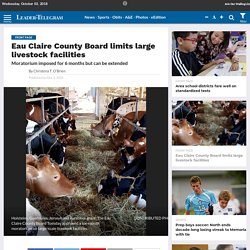
The moratorium also applies to the expansion of of existing livestock facilities if the number of animal units kept at the expanded facility will be 1,000 or more. The moratorium, approved by a 23-5 vote, can be extended for up to six months by a majority vote of the board. Supervisors Carl Anton, Steve Chilson, Gary Gibson, Ray Henning and Pat LaVelle cast the dissenting votes. Livestock facilities are defined as a feedlot, dairy farm or other operation where livestock are or will be fed, confined, maintained or stabled for a total of 45 days or more in any 12-month period.
The Political Environment: Cathy Stepp out of step with Illinois Senators. What water, wetland protection is all about "A little fill here and there may seem to be nothing to become excited about.
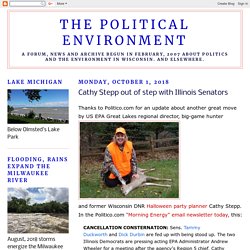
But one fill, though comparatively inconsequential, may lead to another, and another, and before long a great body may be eaten away until it may no longer exist. Our navigable waters are a precious natural heritage, once gone, they disappear forever," wrote the Wisconsin Supreme Court in its 1960 opinion resolving Hixon v.
Untitled. 2 law firms plan to bring case against large farms over high nitrate levels in drinking water. WISCONSIN RAPIDS, Wis.

(WSAW) -- This summer the health departments for Juneau and Wood counties and the Environmental Protection Agency tested private wells and other spots for nitrate contamination. Levels were three to five times beyond the safe limit, so many residents were told to stop drinking their well water all together. That's because consuming nitrates is linked to cancer and other health issues and researchers say the culprit is farms. Because of that, large farms in the central sands area will soon see court papers in their mailboxes. Frustrated people living with that contaminated water filled a banquet hall in Wisconsin Rapids Tuesday night for a meeting. In the Heart of the Corn Belt, an Uphill Battle for Clean Water.
“Health trumps politics,” said Iowa State Senator David Johnson before taking the stage at a raucous rally in Des Moines last winter to support strengthening the state’s water quality.
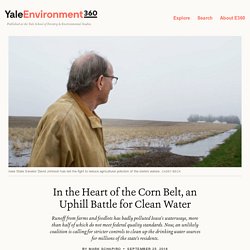
In the marble rotunda of the state capitol, he rose to denounce the nitrogen and phosphates that have been flowing in ever-increasing quantities into Iowa’s public water supplies — and was cheered by the small crowd of family farmers, concerned mothers, and his new political allies, the legislature’s drastically outnumbered Democrats. Johnson had been one of the longest-serving Republicans in Iowa until he left the party to become an independent in 2016 after defying it repeatedly on one of the most divisive issues in Iowa — the integrity of the state’s water. Iowa’s nitrogen load has been accelerating despite more than $100 million spent by the federal and state governments to rein it in.